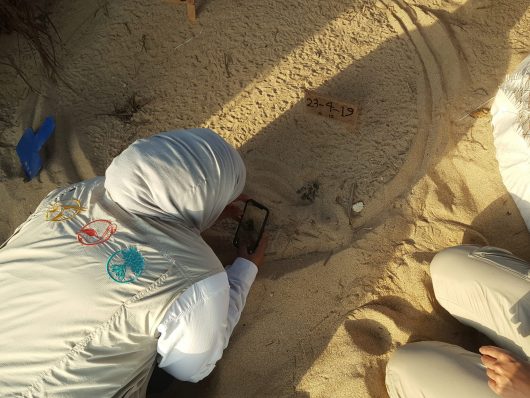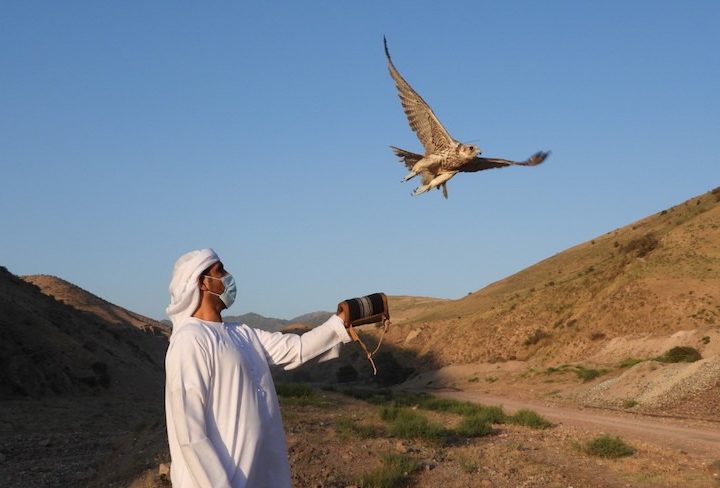Wild Abu Dhabi: The Turtles of Al Dhafra Documentary to Premiere
Biodiversity

January 26, 2021, 10:54 am
The Environment Agency – Abu Dhabi (EAD) has produced a new feature documentary entitled ‘Wild Abu Dhabi: The Turtles of Al Dhafra’, which will be screened for the first time on January 26th at VOX Cinemas at Yas Mall.
This is the fourth film that EAD has produced in the past four years – which include the award winning Zayed’s Antarctic Lights, which chronicles the adventures of the agencies Team Zayed to Antarctica in the Year of Zayed.
The film showcases the groundbreaking work of the EAD team who are dedicated to studying turtles in the hottest sea in the world, the Arabian Gulf, also known as the world’s natural climate change laboratory. The insightful documentary took two years to film.
Abu Dhabi is home to two of the seven species of turtles found on the planet – both of which are threatened – the critically endangered Hawksbills, and the endangered giant Green turtles. EAD has been working on the protection of sea turtles since its establishment 25 years ago as part of its mandate which is dedicated to the conservation of biodiversity and endangered species of all kinds in Abu Dhabi.
Abu Dhabi has a stable population of around 5,500 sea turtles, including 1,500 critically endangered Hawksbill turtles, which nest on offshore islands in the waters of Al Dhafra. It also has 3,500 endangered Green turtles, which forage on Abu Dhabi’s seagrass rich waters, including in a core area of the Marawah Protected Area.
The monitoring efforts undertaken by the agency indicate that there are more than 150 nests per year for the Hawksbill turtles on the islands and the main coast of the Emirate. Most of the nests are located in the six marine reserves that are part of the Zayed Protected Areas Network, which includes 19 terrestrial and marine protected areas.
By collaborating with the Emirates Nature-WWF, EAD has succeeded in placing tracking devices on 36 green turtles that do not nest in the Emirate’s waters, to discover their nesting areas. This study revealed the path of their journey from feeding areas on Bu Tinah Island in Abu Dhabi to nesting areas in the Sultanate of Oman. The turtles then return back to their natural habitat on Bu Tinah Island.
EAD named two of the turtles after the late Sheikh Zayed’s values: “wisdom” and “respect” who crossed more than 10,000 km from the waters of the Emirate of Abu Dhabi, passing through two countries (Pakistan and Iran) before reaching the Sultanate of Oman to nest. Following this they returned back to Bu Tina again.
Since 2005, EAD, together with its partners, began rescuing and rehabilitating sea turtles. More than 700 turtles have been rescued in the waters of the Emirate of Abu Dhabi and returned back to the sea.
Turtles are among the most highly migratory animals on Earth and they are great indicators for the condition of marine environments. This is why EAD and its partners have been studying and monitoring these endangered species since 1999. The research compiled by EAD has helped the Agency to identify important foraging areas for conservation. The making of the documentary is a step towards gathering crucial data which will serve as a major foundation to develop projects and initiatives designed to preserve these endangered turtles.
The documentary will take viewers on an incredible and insightful journey where they will experience how the EAD Team Turtle monitor both Hawksbills and Green turtles. As Hawksbills mainly nest on offshore islands the team head there during the nesting season from March – June. Once the turtles have nested during the night, the team then mark their nests. Six weeks later, once the eggs have hatched, the EAD Team Turtle monitor the size and weight of each hatchling and support them on their journey down the beach and towards the sea. Once the nesting season is over, the team returns to the islands to count how many eggs have hatched in each nest.
The documentary will follow the team as they island hop through beautiful Al Dhafra, conducting challenging scientific research including mapping the movement of Green turtles for the first time in the region The film outlines how EAD is responding to the key threats to turtles – namely climate change, plastics and abandoned fishing gear. The documentary also communicates how the public can be part of the solution.
Her Excellency Dr. Shaikha Salem Al Dhaheri, Secretary General of EAD said: “Despite being a challenging feat, with some parts filmed during the height of summer, the creation of Wild Abu Dhabi: The Turtles of Al Dhafra was an extremely memorable experience and one that has enabled us to present to the public how our team researches the turtles that reside in Abu Dhabi waters. The data gathered during the making of the film will help propel our efforts forward, especially in preserving these endangered species – which is at the forefront of what EAD strives to achieve as part of its integrated strategy to preserve and manage biodiversity in a sustainable manner. This is put into action by setting up conservation programmes for endangered terrestrial and marine species, management of protected areas and preserving natural habitats.”
She added: “With our experienced and highly dedicated team of environmental conservationists we are pleased to be able to show our turtles in their natural environment – from when eggs are laid, to when they hatch and how our new hatchlings travel down the beach for the first time to when they are full grown adults. We are really excited and proud to share this film with everyone.”
Her Excellency Al Dhaheri stressed: “The creation of this documentary has allowed us to present some of the key threats facing our turtles including the impacts of climate change, single use plastics and abandoned fishing gear, and demonstrate why as society our behavioural change is necessary – to give our turtles their best chance of surviving into the future. This includes limiting the amount of single use plastic and rubbish entering the environment which can cause harm to our turtles. Our work with the turtles and mitigating these challenges is just the beginning of what we plan to do in the future. We want these beautiful animals to continue breeding in Abu Dhabi, so that in the future they are no longer considered an endangered species.”
This is the fourth film that EAD has produced in the past four years – which include the award winning Zayed’s Antarctic Lights, which chronicles the adventures of the agencies Team Zayed to Antarctica in the Year of Zayed. Other films include Back to the Wild – which tells the story of the world first reintroduction of the extinct in the wild Scimitar Horned Oryx to their homeland in Chad; and Our Sea Our Heritage which tells the story of the UAE’s fishery and recovery plan.










